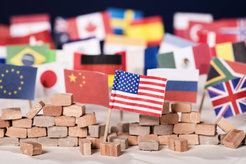National parochialism is widespread around the world
Study with respondents from 42 very different countries shows that fellow citizens are generally preferred
In our globalized world, cooperation between citizens of different countries should actually be a matter of course. But around the world, people prefer to cooperate with their own fellow citizens rather than with foreigners. This was the result of a study by an international team of researchers led by Angelo Romano and Matthias Sutter from the Max Planck Institute for Research on Collective Goods.

Under the "America first" banner, Donald Trump was able to conquer the White House as the President in 2017. Two thirds of US citizens supported his approach which forced national interests into the political foreground. But Americans are not the only ones to be focused on their own country. In a large-scale study involving more than 18,400 participants from 42 nations, an international team of researchers investigated whether and to what extent people in a cooperative game prefer to collaborate with their own fellow citizens. The countries involved ranged from Sweden, Pakistan and South Korea through to Bolivia, Nigeria and New Zealand.
The results were clear: In 39 of the countries examined, most participants significantly preferred to collaborate with fellow citizens rather than with people from other countries. In the remaining three countries (Poland, Peru and Hong Kong), there was also a visible link between the willingness to cooperate and having the same nationality. The tendency to prefer fellow citizens didn’t depend on whether the participants were able to decide anonymously or whether their behaviour would be made public. The nationality of the game partner and the cultural differences were also irrelevant.
Differences within individual nations
However, the researchers also identified differences between the individual test subjects. For example, the willingness to cooperate with foreigners varied significantly more within individual nations than between the averages of different countries. It was greater among women than men, and among more educated participants compared to those with lower levels of education.
Conversely, religious affiliation, certain environmental conditions which could lead to increased national cohesion or the quality of state institutions made no difference. According to the research findings, the behaviour was motivated less by general xenophobia than by what scientists call in-group bias. This means that people tend to show greater solidarity towards others if they perceive them to be part of the same group, in this case citizens of the same country.
Cooperation with unknown others
During the investigation, researchers put participants through a variant of the so-called prisoners' dilemma, a standard experiment in game theory: Participants worked together in pairs. Both were provided with a small amount of money and asked to decide how much of this they would keep and how much they would hand over to the unknown fellow player – without knowing what the other would do. In the process, the amount handed over was doubled, in other words, participants benefitted twice from a generous partner.
The best result for both can be achieved if they cooperate and hand over all of their money. Solo players, however, achieve the best result by acting egoistically and keeping their money, while the other player hands over all of their money to the solo player. The worst result for both occurs if neither hands over any money at all. Whether and how much money is handed over to the unknown fellow player is therefore a matter of trust and cohesion. Obviously, both is clearly more pronounced within individual countries than across different nations.
In light of global challenges like climate change or the coronavirus pandemic, this global distribution of national parochialism is bad news. After all, mankind must cooperate across borders in order to come lastingly to grips with these problems. "While high levels of cooperation within states is desirable, in future we must focus even more strongly on the question of how we can promote cooperation between strangers, independently of their nationality," says Matthias Sutter. He also identifies a high demand for more research in this area.
